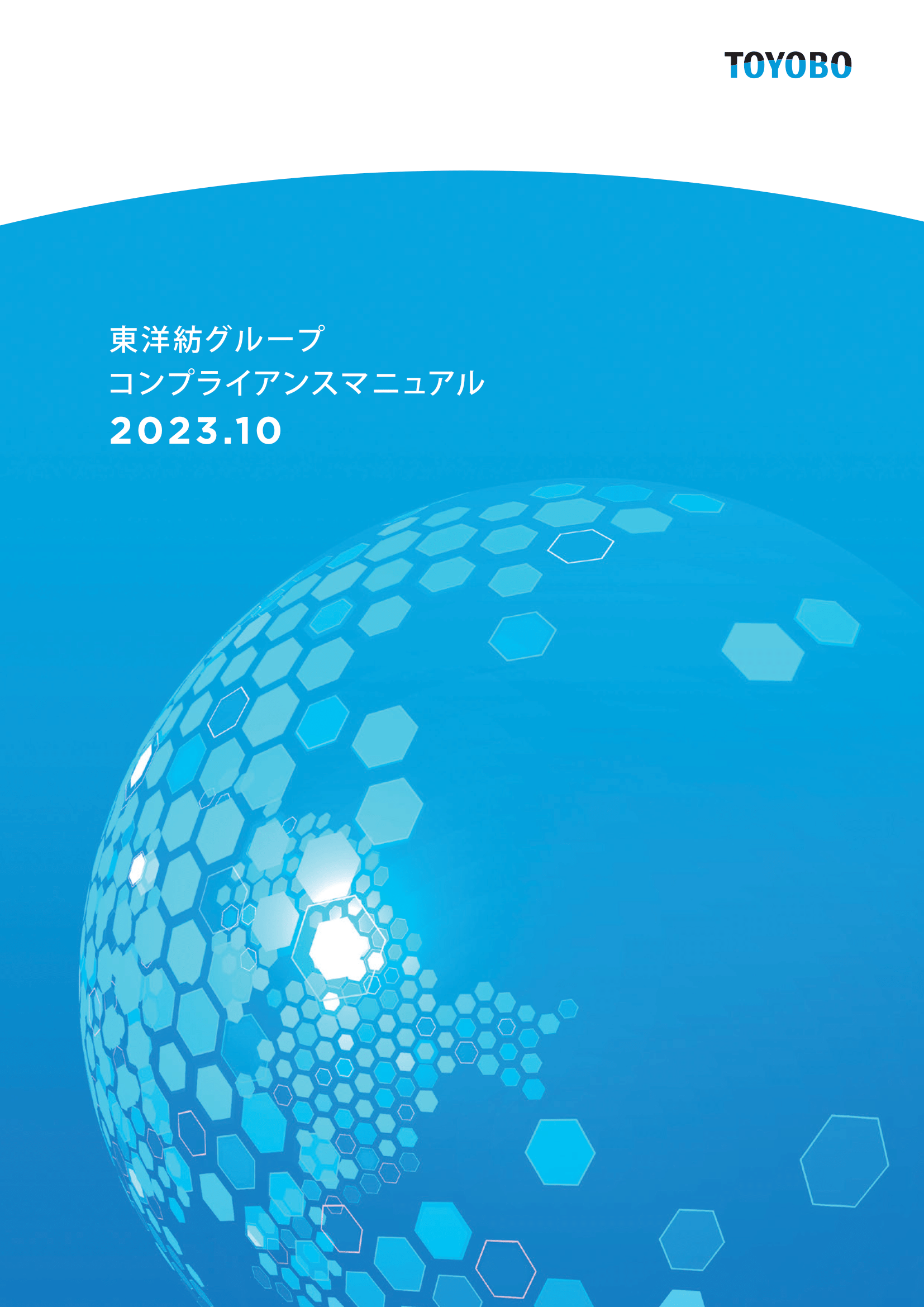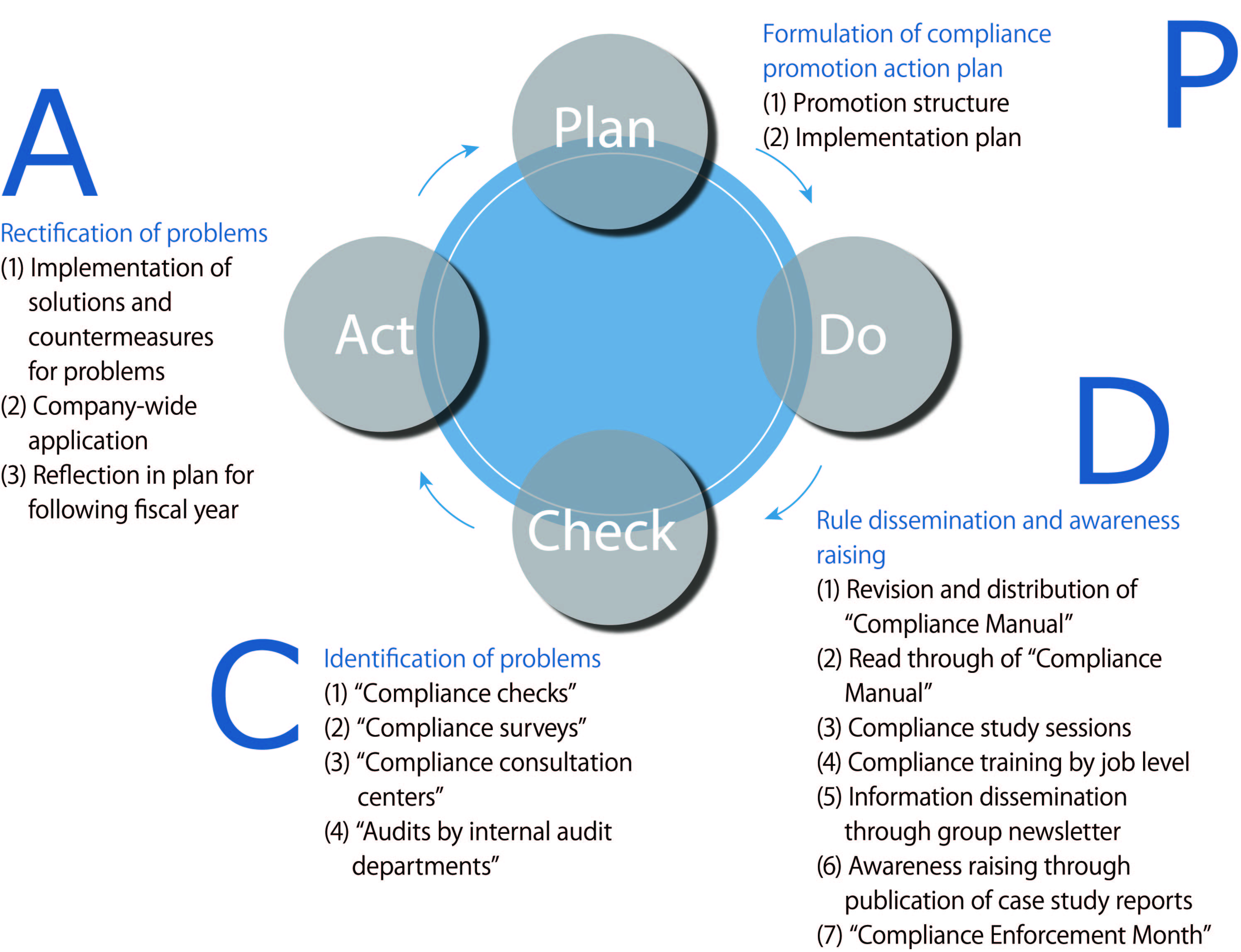Compliance
- Related ESG :
- S G

Management approach
Policy and approach
Based upon our corporate philosophy of Jun-Ri-Soku-Yu (adhering to reason leads to prosperity), at the core of Toyobo group's compliance activities is the idea of "Do what should be done" and "Don't do what should not be done."
Furthermore, based on the fundamental principles stated in the TOYOBO Group Charter of Corporate Behavior, we have established the TOYOBO Group Employee Conduct Standards as the rules all employees must follow. To promote understanding and widespread awareness of the rules among group employees, we distribute the TOYOBO Group Compliance Manual, which clearly explains the standards, and conduct group readings.
TOYOBO Group Compliance Manual / TOYOBO Group Employee Conduct Standards (theme excerpts only)
(23th edition, September 1, 2024)

- 〈Contribution to a sustainable society〉
- Contribution to a sustainable society
- 〈Proper business practices〉
- Handling of company secrets
- Handling of personal information
- Engaging in fair transactions
- Appropriate transactions with subcontractors
- Responsible procurement and logistics
- Rules regarding export and import
- Security trade control (export management)
- Handling of gifts and entertainment (prevention of bribery)
- Handling of political donations, etc.
- Intellectual property
- Proper accounting
- Conclusion of contracts
- Credit management
- 〈Communication with stakeholders〉
- Timely and appropriate information disclosure
- Prohibition of insider trading
- 〈Respect for human rights〉
- Respect for human rights
- 〈Earning trust and ensuring satisfaction〉
- Ensuring the quality and safety of products and services
- Provision of information on products and services
- Appropriate handling of quality data, etc.
- Rules on research and development activities
- Responding to customers and related parties
- 〈Empowering employees〉
- Respect for diversity in the workplace
- Prevention of harassment
- Safety and health
- Appropriate working hours management
- 〈Addressing environmental issues〉
- Business activities taking the global environment into consideration
- 〈Social contribution〉
- Promotion of social contribution
- 〈Thorough crisis management〉
- Process safety and disaster prevention
- Crisis management overseas
- Response to anti-social forces, etc.
- Ensuring cybersecurity
- Social rules
Structure
The Compliance Committee, composed of members from the Board of Management, promotes Group-wide compliance from a management perspective. A sub-committee, the Compliance Promotion Committee, has been established to consider specific initiatives. The Legal and Compliance Department serves as the secretariat for both committees, driving legal compliance and fostering adherence to compliance standards throughout the group.
Compliance promotion cycle

P Formulate of compliance promotion action plan
- Promotion structure
- Implementation plan
D Rule dissemination and awareness raising
- Revision and distribution of the "Compliance Manual"
- Read through of "Compliance Manual"
- Compliance study sessions
- Compliance training by job level
- Information dissemination through Group newsletters
- Awareness raising through publication of case study reports
- "Compliance Enforcement Month"
C Identification of problems
- "Compliance Checks"
- "Compliance Survey"
- "Compliance Consultation centers"
- "Audits by the internal audit departments"
A Rectification of probrems
- Implementation of solutions and countermeasures for problems
- Company-wide application
- Reflection in plan for following fiscal year
Targets and indicators
Targets
Each and every employee complies with laws, regulations, and rules, and acts with integrity. By fostering a shared strong sense of ethics, we aim to cultivate a corporate environment and culture founded on trust.
Indicators and results
| Initiatives | Targets (FY2025) | Results (FY2025) | |
|---|---|---|---|
| Increase in awareness of compliance | Improvement in compliance questionnaire responses |
|
|
| Expansion of compliance study sessions (Managers) and various other trainings |
|
||
| Awareness and use of compliance consultation desks | Improvement in compliance questionnaire responses |
|
|
| Disclosure of no. of cases handled | 116 cases handled | ||
| Disclosure of the number of serious legal violations | ー | 0 violations | |
|
|||
Initiatives
Compliance promotion activities
In fiscal 2025, the Compliance Committee convened twice, and the Compliance Promotion Committee convened four times. Working with the theme of "strengthening organizational capabilities through openness and active listening," we carried out awareness-raising activities to enhance compliance consciousness, provided education and training, handled compliance consultations, and established a global reporting desk that supports overseas operations and multiple languages.
Compliance consultation desks
The Group has established various compliance consultation desks (internal reporting desks) for all employees and executives. These desks receive reports and requests for consultation regarding violations of laws and rules, misconduct, unethical behavior, including corruption such as bribery, embezzlement, and other corrupt practices, violations of competition laws such as bid-rigging and cartels, and bullying and harassment, as well as other issues occurring in the workplace. We strive for early detection, correction, and prevention of these issues.
In fiscal 2025, we began establishing a global internal reporting desk that supports overseas operations and multiple languages, with implementation progressing in stages.
To ensure worry-free use of these consultation desks, we guarantee protection of privacy, including the names of people who seek consultations, ensure that there will be no disadvantage for employees who consult or report, and accept anonymous requests for consultation.
We are making efforts to raise awareness of these consultation desks through means including the distribution of stickers with information on the desks’ usage and the publication of Compliance Mini Study for learning about compliance through case studies.
Topics for consultation
- Legal violations and violations of internal regulations and rules
- Acts that violate the Compliance Manual "Corporate Code of Conduct"
- Workplace harassment
- Consultation on other compliance issues that are difficult to judge, etc.
- The global reporting desk is intended for serious violations, misconduct, and wrongdoing involving executives.
Types of compliance consultation desk
- Internal consultation desk
- External professional service company consultation desk (corporate ethics hotline, including the global internal reporting desk)
- External legal counsel desk
- Audit and Supervisory Committee desk
In fiscal 2025, there were a total of 116 consultations, 11 of which were made through the external compliance consultation desk. The most frequent breakdown was communication, personal relationships, harassment, followed by personnel, labor relations (attendance, treatment, etc.). Depending on the contents of the consultation, we implemented corrective measures, recommended disciplinary action, provided advice to the consulting parties, and answered their questions.
Number of consultations for compliance consultation desks (internal reporting service)
| FY2021 | FY2022 | FY2023 | FY2024 | FY2025 |
|---|---|---|---|---|
| 37 | 62 | 78 | 102 | 116 |
Details of consultations (FY2025)
| Details of consultations | Incidents |
|---|---|
| Communication, personal relations, harassment | 40 |
| Personnel, labor relations (attendance, treatment, etc.) | 22 |
| Misconduct, violations, and breaches of work rules, etc. | 7 |
| Workplace issues concerning the company as a whole (systems, policies, etc.) | 18 |
| Work attitude | 3 |
| Others | 26 |
| Total | 116 |
Process for handling consultations at compliance consultation desks
- Verify the content of the consultation or report received at the reporting desk.
- Conduct fact-finding investigations through the reporting desk and relevant departments or companies, including verification of evidence and interviews with the involved parties or third parties.
- Assess the presence and severity of any violations or misconduct based on the investigation results.
- If a violation or misconduct is confirmed, implement corrective and recurrence prevention measures through the relevant departments or companies based on the nature of the issue. Provide guidance or impose disciplinary action on the responsible individuals as appropriate, and implement recurrence prevention measures across the group.
- Provide feedback to the reporting or consulting individual via the reporting desk and follow up on corrective actions as needed.
Education and awareness-raising activities
Formulation, revision and dissemination of compliance manual
We established the TOYOBO Group Employee Conduct Standards, which outline the rules that all employees of Toyobo Group must adhere to, in accordance with the corporate ethics provisions outlined in the TOYOBO Group Charter of Corporate Behavior.
In 2000, we issued the TOYOBO Group Compliance Manual, which provides a clear and understandable explanation of the Employee Conduct Standards, and distributed it to all employees. Subsequently, we have issued global versions in English and Chinese and have been revising the Manual gradually. At overseas locations, we are creating localized versions tailored to the laws, regulations, and customs of each country or region.
We promote awareness of the Charter of Corporate Behavior and Employee Conduct Standards through training that includes readings of the Manual at workplaces, among other efforts.This training applies to all officers and employees of our Group, including contract, temporary, and part-time positions. Overseas personnel are assigned from Japan.
The Manual includes measures to prevent corruption, bribery, and other corrupt practices, bid-rigging, cartels, unfair competition, improper accounting, along with provisions for health and safety, proper management of working hours, and prevention of bullying and harassment.
Awareness-raising activities during Compliance Enforcement Month
Every October is designated as Compliance Enforcement Month within Toyobo Group. During this time, various initiatives are undertaken collectively throughout the Group, including the dissemination of a message from the president, readings of the Compliance Manual, hosting of compliance study sessions, and conducting compliance questionnaires. We also use posters and digital signage to communicate information about the consultation desk for compliance.
Holding compliance study sessions (training)
In fiscal 2025, we distributed a video of the compliance study sessions (training) targeting management-level personnel—including general managers, managers, section chiefs, and supervisors— as well as general employees across all Toyobo business sites and affiliate companies. Instructors from the Compliance Department and HR and Labor Department led the sessions, which covered topics such as general compliance and harassment prevention. A total of 4,472 employees participated in these sessions, including 812 mandatory participants.
Various other trainings
As part of level-specific and occupation-specific training for managers, new employees, sales staff, and personnel being sent on overseas assignments, compliance education is provided. In fiscal 2025, a total of 30 various training sessions were held.
We also implemented discussion-type training for managers, focusing on topics that are of particular importance to the company, such as safety, quality, and compliance (e.g., accounting fraud prevention, bullying and harassment prevention).
Mini study and report issuance
We publish the “Compliance Mini Study,” which educates employees on potential workplace violations using a case study format (in principle, Japanese versions in odd-numbered months and multilingual versions in even-numbered months), as well as "Compliance Reports," issued on an ad hoc basis and based on actual cases of workplace violations.
Compliance and risk assessment
During Compliance Enforcement Month held each year, we conduct an anonymous questionnaire to assess compliance awareness and to identify any compliance-related issues within Toyobo Group companies. When issues are identified, we take corrective action and work to improve our compliance initiatives. The survey also serves as a self-check tool for respondents, and by conducting it regularly, we aim to further raise compliance awareness across the organization.
In fiscal 2025, we received 7,660 responses from employees, with the aggregated and analyzed results of the questionnaire disclosed to all employees. Details on individual problems and issues are shared with related departments in a form that does not identify the respondent—this proves useful in improving the situation and preventing problems.
Anti-corruption initiatives
The Group positions the prevention of corruption, bribery and other corrupt practices, bid-rigging, cartels, unfair competition, and improper accounting, as priority issues in compliance. In particular, to prevent bribery and other corrupt practices, along with policies and regulations, we have also set guidelines that detail specific rules covering matters such as judgments and monetary standards when giving gifts and entertainment. We work to make these known through inclusion in the Compliance Manual and explanations given during training programs.
To build fair and sound business relationships with partners, we have put in place rules for the receipt of gifts or entertainment. These include a requirement to refuse money or the equivalent, or gifts and entertainment that exceed socially accepted norms, and we have introduced a reporting system for the receipt of gifts and entertainment. In fiscal 2025, we conducted a survey of departments more likely to receive such offerings and confirmed that there were no problematic instances.
In fiscal 2025, there were no violations of anti-corruption laws, no administrative penalties, employee dismissals, fines, or surcharges related to corrupt practices.
Assessment of Corruption Risks
In fiscal 2022, as part of our Company-wide risk management activities, we conducted a comprehensive risk identification and determined our critical risks through an assessment based on two axes: impact and likelihood of occurrence.
Among these, we selected legal and compliance risks including corruption risks. Following the decisions on activities by the Risk Management Committee chaired by the President, the departments responsible for risk management are leading the ongoing implementation of control measures.
From fiscal 2023 through fiscal 2025, we conducted assessments of significant risks including corruption risks at Group companies including overseas locations. and engaged in dialogues based on anticipated risk scenarios. We confirmed the magnitude of risks at each location and the status of responses, thereby comprehensively grasping legal compliance risks.
Furthermore, in fiscal year 2026, we conducted more specific risk assessments across the entire Group, which covered violations of the Foreign Corrupt Practices Act and illegal political contributions and related donations. As a result, we confirmed that no significant corruption risks exist at each office or location.
We also utilize the assessment results to review and improve our compliance framework for corruption prevention. We have established a system to respond promptly in the event of an incident by working closely with relevant departments.
Going forward, we will continue to periodically (annually) review and assess risks in response to changes in the external business environment and our own business operations, implementing appropriate risk management across the entire Group.
Supervision by Directors
Every year, the Board of Directors receives a report on compliance activities, including anti-corruption efforts. Outside Directors and Corporate Auditors (who have served as Audit and Supervisory Committee members since June 2025) provide effective oversight from an external perspective.







